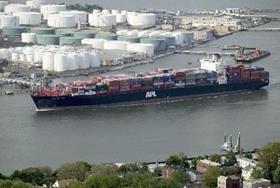
NOL Group, the Singapore-based container shipping and logistics company, today (May 9) reported a first quarter 2012 net loss of US$254m compared to a net loss of US$10m in the same period last year.
The firm said high fuel costs and low freight rates in container shipping affected first quarter 2012 performance.
NOL’s supply chain management business, APL Logistics, reported a 7 per cent increase in first quarter revenue. Core EBIT (Earnings Before Interest and Taxes) in the logistics business was US$13m.
“There were positive signs in the first quarter – the freight rate increases in March and growth in the logistics business,” said NOL Group CEO Ng Yat Chung. “But we must continue to aggressively manage our operating costs, and streamline our organisation for greater efficiency.”
APL, NOL’s liner shipping business, reported first quarter 2012 revenue of US$2bn, down 4 per cent from a year ago. Revenue per FEU (forty-foot equivalent unit) declined 7 per cent,due mostly to lower rates. Bunker fuel price increased from US$523/tonne in 1Q 2011 to US$684/tonne in 1Q2012. APL reduced fuel consumption by 75,000 tonnes even though overall cargo volume increased 4 per cent in the first quarter.
“Rates have been moving up since March, but not yet enough to offset the high cost of fuel,” said APL president Kenneth Glenn. “Much more remains to be done to increase rates and manage down expenses.”
NOL said that in the first quarter of 2012 it achieved about US$100m of cost savings under its ongoing programme and it is on track to achieve US$500m worth of savings for 2012. The savings were primarily through reduced fuel consumption and improved operational costs.
NOL is also undertaking an organisational restructuring that will result in an additional annual savings of about US$70m from 2013 onwards. The company said that its organisation structure around the world will be streamlined to shorten decision cycles and respond better to market changes and evolving customer needs.
Looking ahead, the company said the group's financial performance would remain weak if conditions for rates and fuel costs do not improve.






No comments yet